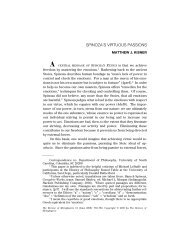heidegger's being and time and national socialism - Philosophy ...
heidegger's being and time and national socialism - Philosophy ...
heidegger's being and time and national socialism - Philosophy ...
You also want an ePaper? Increase the reach of your titles
YUMPU automatically turns print PDFs into web optimized ePapers that Google loves.
<strong>and</strong> only out of this do the future <strong>and</strong> the Present<br />
temporalize themselves. . . . The future <strong>and</strong> the<br />
Present of anxiety temporalize themselves out of a<br />
primordial Being-as-having-been in the sense of<br />
bringing us back to repeatability....Anxiety liberates<br />
him from possibilities which ‘count for nothing’,<br />
<strong>and</strong> lets him become free for those which are<br />
authentic. 110<br />
Anxiety leads Dasein, via the authentic<br />
futurality of anticipation of death, out of<br />
inauthentic futurality back into the past, havingbeen,<br />
as that which can be repeated. In addition,<br />
in doing so it opens up for Dasein the prospect of<br />
authentic existence <strong>and</strong> of an authentic future,<br />
which is obviously related to the possible repetition<br />
of having-been. As I emphasized, while liberals<br />
<strong>and</strong> leftists alike were oriented toward the<br />
future, rightists claimed that the move forward,<br />
progress, had to be cancelled to re-realize community.<br />
What Heidegger anticipates here in the<br />
passage on anxiety from the chapter “Temporality<br />
<strong>and</strong> Everydayness” he will explicate in<br />
§74 <strong>and</strong> summarize also in the quote from<br />
§75 that I presented toward the end of section<br />
one.<br />
Since right-wing authors assumed that society<br />
was just a downward plunge, they could not rely<br />
on any inner tendency of society that might lead<br />
to a transformation of society. Thus Heidegger<br />
assumes that the call of conscience <strong>and</strong> anxiety<br />
come from outside of society, ultimately from<br />
destiny, as I summarize in the next section.<br />
Heidegger’s theory of the call <strong>and</strong> anxiety is his<br />
right-wing equivalent to Lukács’ theory of the<br />
proletariat as the self-consciousness of the commodity.<br />
111<br />
§74 of Being <strong>and</strong> Time<br />
With the four chapters on death, conscience,<br />
care, <strong>and</strong> the temporality of everydayness<br />
Heidegger sets the stage for §74, <strong>and</strong> he obviously<br />
does so in such a way that one cannot but<br />
expect as the heart of the drama of historicality<br />
the return of the past, having-been, the actualization<br />
of the possibility that anxiety opens up. I already<br />
presented the structure <strong>and</strong> the content of<br />
the drama of historicality. In this section, I review<br />
PHILOSOPHY TODAY<br />
266<br />
the decisive sentences of §74 in light of the two<br />
preceding sections. As was already mentioned,<br />
Scheler <strong>and</strong> other rightists maintain that, before<br />
destiny explicitly steps out into the open <strong>and</strong> delivers<br />
its comm<strong>and</strong>, it announces itself through<br />
signs indicating something new, <strong>and</strong> the authentic<br />
possibilities are already present, though in a<br />
fragmented way <strong>and</strong> covered up by the work of<br />
ambiguity of the They. In addition, Heidegger<br />
distinguishes in Being <strong>and</strong> Time different levels<br />
of primordiality, <strong>and</strong> the level of historicality is<br />
the most primordial one. 112 Furthermore, a phenomenon<br />
has become as clearly visible as it can<br />
be only at the end of the way which the<br />
phenomenological method is. 113 These facts<br />
combine to make it as unavoidable as, from a<br />
dramaturgical point of view, desirable that the<br />
main player in history, destiny, is revealed only at<br />
the culmination of the entirety of Being <strong>and</strong> Time,<br />
in §74. §74 begins with a reference back to resoluteness<br />
<strong>and</strong> the reticent Dasein in the chapters<br />
on conscience <strong>and</strong> the temporality of care. 114 This<br />
is followed by a reference to the They (“It underst<strong>and</strong>s<br />
itself . . . made unrecognizable by ambiguity;<br />
yet ...interms of this interpretation, against<br />
it, <strong>and</strong> yet again for it . . .”), 115 which makes it<br />
clear that authentic Dasein looks through the<br />
work of ambiguity—the double forgetting <strong>and</strong><br />
the suppression of the new practiced by the<br />
They—<strong>and</strong> leaves the They by recognizing the<br />
suppressed possibilities as the authentic ones. In<br />
addition, Heidegger already indicates that authentic<br />
Dasein turns against the They <strong>and</strong> that it<br />
does so in order to redeem the They <strong>and</strong> the<br />
inauthentic Dasein. 116 Thus the opposition<br />
between the authentic Dasein <strong>and</strong> the inauthentic<br />
ones comes to the fore, the precondition of the<br />
former becoming the conscience of the latter.<br />
In the section on conscience, toward the end<br />
of §58, Heidegger writes:<br />
Wanting to have a conscience is rather the most<br />
primordial existentiell presupposition for the possibility<br />
of factically becoming guilty. In underst<strong>and</strong>ing<br />
the call, Dasein lets its ownmost Self take<br />
action in itself [in sich h<strong>and</strong>eln] in terms of that potentiality-for-Being<br />
which it has chosen. Only so<br />
can it be answerable [verantwortlich]. Factically,
















